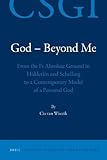God, beyond me : from the I's absolute ground in Hölderlin and Schelling to a contemporary model of a personal God / by Cia van Woezik.
Material type: TextSeries: Critical studies in German idealism ; v. 1.Publication details: Leiden ; Boston : Brill, 2010.Description: 1 online resource (x, 457 pages)Content type:
TextSeries: Critical studies in German idealism ; v. 1.Publication details: Leiden ; Boston : Brill, 2010.Description: 1 online resource (x, 457 pages)Content type: - 9789004182172
- 9004182179
- 9004181865
- 9789004181861
- 211 22
- BD450 .W63 2010eb
- online - EBSCO
| Item type | Current library | Call number | URL | Status | Notes | Barcode | |
|---|---|---|---|---|---|---|---|
 eBook
eBook
|
Biblioteca "Angelicum" Pont. Univ. S.Tommaso d'Aquino Nuvola online | online - EBSCO (Browse shelf(Opens below)) | Online access | Not for loan (Accesso limitato) | Accesso per gli utenti autorizzati / Access for authorized users | (ebsco)338701 |
Browsing Biblioteca "Angelicum" Pont. Univ. S.Tommaso d'Aquino shelves, Shelving location: Nuvola online Close shelf browser (Hides shelf browser)
Includes bibliographical references and index.
German idealism has attempted to think an absolute ground to self-conscious I-hood. As a result it has been theologically disqualified as pantheistic or even atheistic since many maintain that such a ground cannot be reconciled with a personal God. In the early writings of Friedrich Schelling (1775-1854), it is clear that he and his contemporaries were aware of this difficulty. His TA1/4binger fellow student, Friedrich HAlderlin (1770-1843), was convinced of the ultimate inadequacy of any philosophical system to grasp the unitary ground of all that is and turned to poetry. The metaphysical ins.
Print version record.
Introduction; Chapter One I-hood; 1.1. A Brief Phenomenology of I-hood; 1.2. Two Models of Self-Consciousness in German Idealism; 1.2.1. The Reflection Model of Self-Consciousness; 1.2.2. Fichte's Attempts to Escape the Reflection Model; 1.3. Henrich's Metaphysical Model of Self-Consciousness; 1.3.1. Henrich's Defense of a Philosophy of Subjectivity; 1.3.2. Three Classical Approaches to Self-Consciousness; 1.3.2.1. The I Opposed to the World -- The Kantian Angle; 1.3.2.2. The I within the World -- The Hegelian Angle; 1.3.2.3. Self-Preservation -- The Stoic Angle.
1.3.3. The Basic Relation [Grundverhältnis]1.3.4. Towards a Theory of Self-Consciousness; 1.3.5. Analysis of Self-Consciousness Based on Fichte; 1.3.6. The Subject's Being-With [Mitsein]; Excursus: A Naturalistic Model of I-hood; 1.4. From Here Onwards; Chapter Two From the I to the Absolute; 2.1. Connecting Kant and Spinoza; 2.2. Baruch de Spinoza; 2.2.1. Substance or Deus sive Natura; 2.2.2. Attributes and Modes of the One Substance; 2.2.3. Free Will and Intention; 2.2.4. The Role of Philosophy and Religion; 2.3. The Early Reception of Spinoza's Philosophy; 2.4. Pantheism Controversy.
2.5. Merging the Absolute with the God of the Bible2.6. The I and the Absolute; 2.7. From Here Onwards; Chapter Three Schelling: The I and its Ground; 3.1. Philosophical Stages and Teachers; 3.2. The Absolute as I in the Early Schelling; 3.3. Attempts at Cutting the Gordian Knot of Philosophy; 3.3.1. Philosophy of Nature; 3.3.2. Transcendental Philosophy; 3.3.3. System of Identity; 3.4. Philosophy as the System of Freedom; 3.4.1. The Absolute and God; 3.4.2. God and World; 3.4.3. World and Evil; 3.4.4. Evil and God; 3.5. From Here Onwards; Chapter Four Hölderlin: The I and its Ground.
4.1. Judgment and Being4.2. Self-Consciousness; 4.3. Worldly Echoes of Being; 4.3.1. Being and the Innocent; 4.3.2. Being and Nature; 4.3.3. Being, Beauty, and the Poet; 4.4. Religion; 4.5. Life's Conflicting Tendencies; 4.6. Being and History; 4.7. The Eschaton and Celebration of Peace; 4.7.1. Christ; 4.7.2. The Father, Being, and All-Unity; 4.8. From Here Onwards; Chapter Five Intellectual Intuition and Metaphysics; 5.1. Fichte; 5.1.1. Intellectual Intuition in Line with Kant; 5.1.2. Idealism versus Dogmatism; 5.2. Schelling; 5.2.1. From Fichte's Absolute I to Spinoza's Substance.
5.2.2. Schwärmerei, Art, or Philosophy?5.3. Hölderlin; 5.3.1. Poetry and Philosophy; 5.3.2. Grasping the Father's Ray . . .; 5.3.3. ... and Wrapping it in Song; 5.3.4. The Hubris of the Poet; 5.4. From Here Onwards; Chapter Six The Absolute Ground versus God; 6.1. Henrich's Metaphysics; 6.1.1. An Absolute and Obscure Ground; 6.1.2. All-Unity and Freedom; 6.1.3. The Philosopher about Religion; 6.1.3.1. Explanation for the Variety of Religions; 6.1.3.2. Gratitude as the Basis of Religious Praxis; 6.2. Rahner's Metaphysics; 6.2.1. Being and Beings; 6.2.1.1. The Openness for Being.









